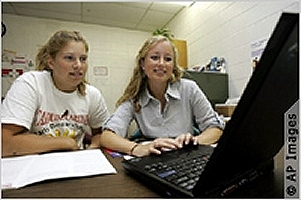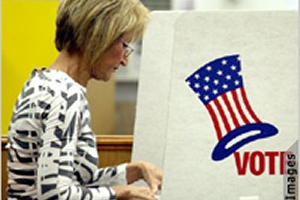America in context
The Young as Advisers to the Young

Meet some young Americans who have taken time off before going on to graduate education or embarking on a career to help students from low-income families get a higher education.
In 2006, the University of Virginia (UVA) created a program that placed recent college graduates as higher education advisers in Virginia secondary schools that had low rates of college attendance. The college guides, as the program called them, were so successful in such a short time — raising the college attendance rate at one school 20 percent the first year — that a private foundation awarded 10 grants of $1 million apiece to replicate the UVA program in 10 other states, giving birth to the National College Advising Corps (NCAC).
“Most high school students want to go to college,” said Ebonie Leonard, who advises at a secondary school in Durham, North Carolina. “They just have trouble figuring out how to get there. So a big part of my job is demystifying the college process.”
NCAC recruits and trains recent college graduates to work as full-time advisers, offering them a stipend of $20,000. The advisers provide guidance on college admission and financial aid to secondary school students and their parents — especially those from lower-income families — helping them apply to postsecondary institutions that fit their individual academic profiles, career goals and personal circumstances. They may also lead visits to college campuses and coordinate workshops, fairs and other events for students interested in pursuing postsecondary education.
The U.S. Department of Education repeatedly has called attention to the significant number of academically prepared students from lower-income families who do not attend college, estimating that 4 million potential college graduates have been "lost" during the past two decades.
“I knew many people at my high school [who] fell through the cracks because they did not have the help that they needed to find the right college or scholarship information,” said Leonard.
National College Advising Corps recruits listen during a training session in Chapel Hill, North Carolina in 2007.As of the 2004-2005 school year, public secondary schools average only one counselor for every 479 students, according to the American School Counselor Association. Moreover, secondary school counselors have numerous responsibilities besides career planning, such as identifying and intervening on behalf of students in crisis, providing substance abuse education and teaching diversity awareness.
Sarah Borish, a 2007 graduate of UVA and an NCAC adviser in Nelson, Virginia, has found that the students she sees — some of whom provide critical support for their families — are worried about paying for college. “In some cases, their parents are telling them that they won’t be able to afford it. In other cases, they’re just assuming that times are too tough for higher education to be an option.” The challenge, she said, is convincing them “there are still ways to get to college without going too heavily into debt.”
Borish grew up in a family in which both her parents and grandparents had attended college. “Everyone in my family had an opinion and their own advice,” she said, adding that the average secondary school student in her state spends only 20 minutes over four years with a counselor. “While I didn’t always appreciate the guidance my parents and grandparents insisted upon sharing, their push made it possible for me to be accepted at the University of Virginia. Their support started long before I even thought about college, and that is particularly different from my students.”
Borish said that because most students in the mountain community where she advises do not go on to postsecondary education, “it feels like an uphill struggle to get students thinking about college early and often.”
It’s not an easy job. So what motivates graduating seniors to become NCAC advisers?
“I have been so fortunate in my life, and I felt it was only appropriate to give back in some way,” said Borish. “Access to higher education was already an issue about which I was passionate, and I loved the idea of working directly with high school students.”
“Working with high school students is great because they find out that you care about them and want the best for them,” Leonard said, adding, “they are very appreciative and responsive.”
But the rewards of the job more than compensate for the challenges. “There is nothing more exciting than when the students get accepted into their first-choice college,” Borish said. “I love the spring semester when everything feels like it’s coming together for them. I’ve been thrilled to find out that many of my students have kept in touch with me as they started school this fall, and I think that has more to do with getting to know them on a personal level than working with them on the application process.”
Student Adviser Dexter Robinson
Student Adviser Lillian O’Donnell
Program Instills Passion for Service
By Jeffrey Thomas
Staff Writer
Recently on America in context
International Student Enrollment at U.S. Colleges Breaks Records
 The number of non-U.S. students enrolled in U.S. higher education institutions during the 2007-2008 academic year jumped 7 percent to a record total of 623,805, according to a report from the Institute of International Education (IIE). First-time enrollments increased 10 percent in 2007-2008, following a similar 10 percent rise the previous year.
The number of non-U.S. students enrolled in U.S. higher education institutions during the 2007-2008 academic year jumped 7 percent to a record total of 623,805, according to a report from the Institute of International Education (IIE). First-time enrollments increased 10 percent in 2007-2008, following a similar 10 percent rise the previous year.
Population Changes Likely to Influence U.S. Election
 In 2008 the U.S. electorate is younger, better educated and more diverse than it was when the nation first elected President Bush in 2000, and these population shifts will affect the November 4 election and help shape America’s future political landscape, analysts say.
In 2008 the U.S. electorate is younger, better educated and more diverse than it was when the nation first elected President Bush in 2000, and these population shifts will affect the November 4 election and help shape America’s future political landscape, analysts say.
U.S. Democracy Has Come a Long Way
 America's Founding Fathers would be "astounded" to see the presidential race of 2008, James Glassman, under secretary of state for public diplomacy and public affairs, said October 27.
America's Founding Fathers would be "astounded" to see the presidential race of 2008, James Glassman, under secretary of state for public diplomacy and public affairs, said October 27.